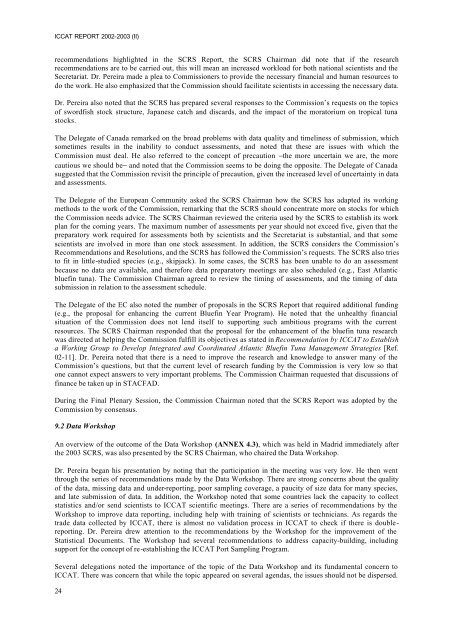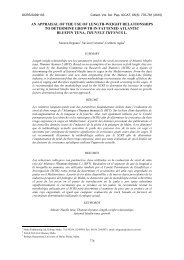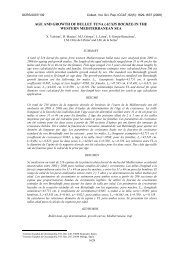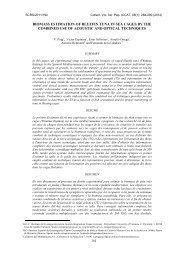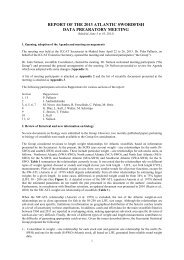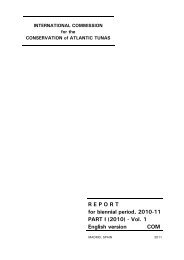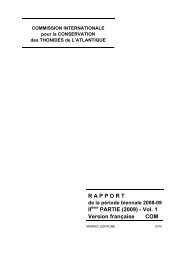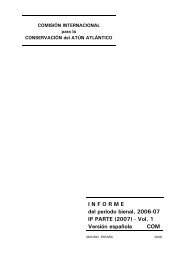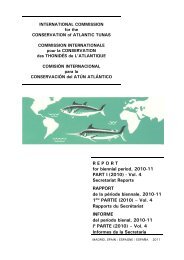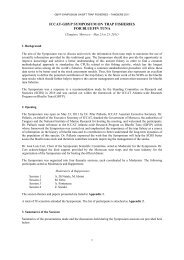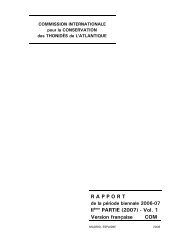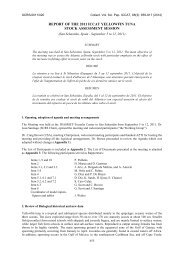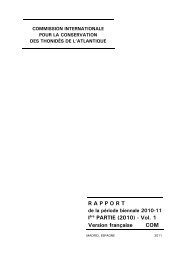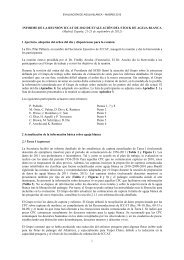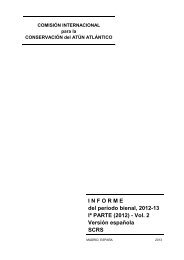E - Iccat
E - Iccat
E - Iccat
You also want an ePaper? Increase the reach of your titles
YUMPU automatically turns print PDFs into web optimized ePapers that Google loves.
ICCAT REPORT 2002-2003 (II)<br />
recommendations highlighted in the SCRS Report, the SCRS Chairman did note that if the research<br />
recommendations are to be carried out, this will mean an increased workload for both national scientists and the<br />
Secretariat. Dr. Pereira made a plea to Commissioners to provide the necessary financial and human resources to<br />
do the work. He also emphasized that the Commission should facilitate scientists in accessing the necessary data.<br />
Dr. Pereira also noted that the SCRS has prepared several responses to the Commission’s requests on the topics<br />
of swordfish stock structure, Japanese catch and discards, and the impact of the moratorium on tropical tuna<br />
stocks.<br />
The Delegate of Canada remarked on the broad problems with data quality and timeliness of submission, which<br />
sometimes results in the inability to conduct assessments, and noted that these are issues with which the<br />
Commission must deal. He also referred to the concept of precaution −the more uncertain we are, the more<br />
cautious we should be− and noted that the Commission seems to be doing the opposite. The Delegate of Canada<br />
suggested that the Commission revisit the principle of precaution, given the increased level of uncertainty in data<br />
and assessments.<br />
The Delegate of the European Community asked the SCRS Chairman how the SCRS has adapted its working<br />
methods to the work of the Commission, remarking that the SCRS should concentrate more on stocks for which<br />
the Commission needs advice. The SCRS Chairman reviewed the criteria used by the SCRS to establish its work<br />
plan for the coming years. The maximum number of assessments per year should not exceed five, given that the<br />
preparatory work required for assessments both by scientists and the Secretariat is substantial, and that some<br />
scientists are involved in more than one stock assessment. In addition, the SCRS considers the Commission’s<br />
Recommendations and Resolutions, and the SCRS has followed the Commission’s requests. The SCRS also tries<br />
to fit in little-studied species (e.g., skipjack). In some cases, the SCRS has been unable to do an assessment<br />
because no data are available, and therefore data preparatory meetings are also scheduled (e.g., East Atlantic<br />
bluefin tuna). The Commission Chairman agreed to review the timing of assessments, and the timing of data<br />
submission in relation to the assessment schedule.<br />
The Delegate of the EC also noted the number of proposals in the SCRS Report that required additional funding<br />
(e.g., the proposal for enhancing the current Bluefin Year Program). He noted that the unhealthy financial<br />
situation of the Commission does not lend itself to supporting such ambitious programs with the current<br />
resources. The SCRS Chairman responded that the proposal for the enhancement of the bluefin tuna research<br />
was directed at helping the Commission fulfill its objectives as stated in Recommendation by ICCAT to Establish<br />
a Working Group to Develop Integrated and Coordinated Atlantic Bluefin Tuna Management Strategies [Ref.<br />
02-11]. Dr. Pereira noted that there is a need to improve the research and knowledge to answer many of the<br />
Commission’s questions, but that the current level of research funding by the Commission is very low so that<br />
one cannot expect answers to very important problems. The Commission Chairman requested that discussions of<br />
finance be taken up in STACFAD.<br />
During the Final Plenary Session, the Commission Chairman noted that the SCRS Report was adopted by the<br />
Commission by consensus.<br />
9.2 Data Workshop<br />
An overview of the outcome of the Data Workshop (ANNEX 4.3), which was held in Madrid immediately after<br />
the 2003 SCRS, was also presented by the SCRS Chairman, who chaired the Data Workshop.<br />
Dr. Pereira began his presentation by noting that the participation in the meeting was very low. He then went<br />
through the series of recommendations made by the Data Workshop. There are strong concerns about the quality<br />
of the data, missing data and under-reporting, poor sampling coverage, a paucity of size data for many species,<br />
and late submission of data. In addition, the Workshop noted that some countries lack the capacity to collect<br />
statistics and/or send scientists to ICCAT scientific meetings. There are a series of recommendations by the<br />
Workshop to improve data reporting, including help with training of scientists or technicians. As regards the<br />
trade data collected by ICCAT, there is almost no validation process in ICCAT to check if there is doublereporting.<br />
Dr. Pereira drew attention to the recommendations by the Workshop for the improvement of the<br />
Statistical Documents. The Workshop had several recommendations to address capacity-building, including<br />
support for the concept of re-establishing the ICCAT Port Sampling Program.<br />
Several delegations noted the importance of the topic of the Data Workshop and its fundamental concern to<br />
ICCAT. There was concern that while the topic appeared on several agendas, the issues should not be dispersed.<br />
24


